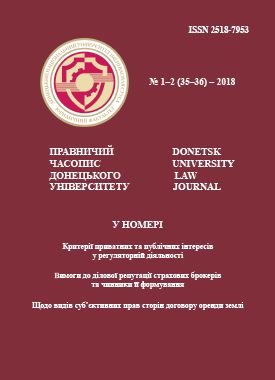Тhe category of the legal existence in Plato`s doctrine.
DOI:
https://doi.org/10.31558/2518-7953.2018.1-2.1Keywords:
right, being, Plato, state, ontology, antiquity, idea, logos, myth, space, lawAbstract
The article discovers the main characteristics of legal ontology, which Plato highlights in his writings, reveals the main essential powers that define the law. The author determined that justice is a concept that is identified with the law, it ingicates civilized human dignity, non-compliance with it makes suffering. The law may be different, and it is important his connection with legal existence, the law is just a form, a cup that needs to be filled with content.
It is proved that logos, freedom and constructive coexistence are three key pillars on which the legal existence of Plato is based. Superhuman and supra-state metaphysical law gives grounds for justice and norms.
For Plato, the idea is not exposed to time, it is always equally true. Thus, the legal existence is called to keep the legal criterion as clearly as possible so as not to lose its content in the field of political and legal changes.
From the doctrine of Plato we can highlight the forces that affect the existence of space. First, it’s a destiny. This means that all time measurements in outer space are open. Destiny moves the cosmos to a certain future, that’s why nothing is taken from nowhere, and nowhere does it happen, everything is organized even in the time dimension. Thus, the task of law is not prediction of the future, but giving of all possible variants of behavior and their placement in legal reality. The second force is a strong desire. It is also an inalienable ontological attribute of law, since one way or another, it is expressed in certain ordinances, with certain will – to do something or refrain from certain actions. Consequently, the legal existence is always some kind of will, which must be performed, otherwise it is an isolated phenomenon and processes.
The imagery of myth for Plato is an analogy that the human conscience needs in order to perceive the hegemony of reason in its relationship.
References
Платон. Держава. Пер. з давньогр. Д. Коваль. Київ. Основи. 2000. 355 с.
Платон. Законы. Диалоги. Москва. «Мысль». 1986. URL: http://psylib.org.ua/books/ plato01/30zak09.htm
Платон. Политик. Диалоги. Москва. «Мысль». 1986. URL: http://psylib.org.ua/ books/plato01/29polit.htm
Ницше Ф. Рождение трагедии из духа музыки. Пер. с нем. Г. А. Рачинского. СПб. Азбука. 2000. 230 с. URL: http://www.nietzsche.ru/works/main-works/tragoedie/births-tragedies
Платон. Софист. Диалоги. Москва. «Мысль». 1986. URL: http://psylib.org.ua/books/ plato01/23sofis.htm
Платон. Парменид. Диалоги. Москва. «Мысль». 1986. URL: http://psylib.org.ua/books/ plato01/24parme.htm

